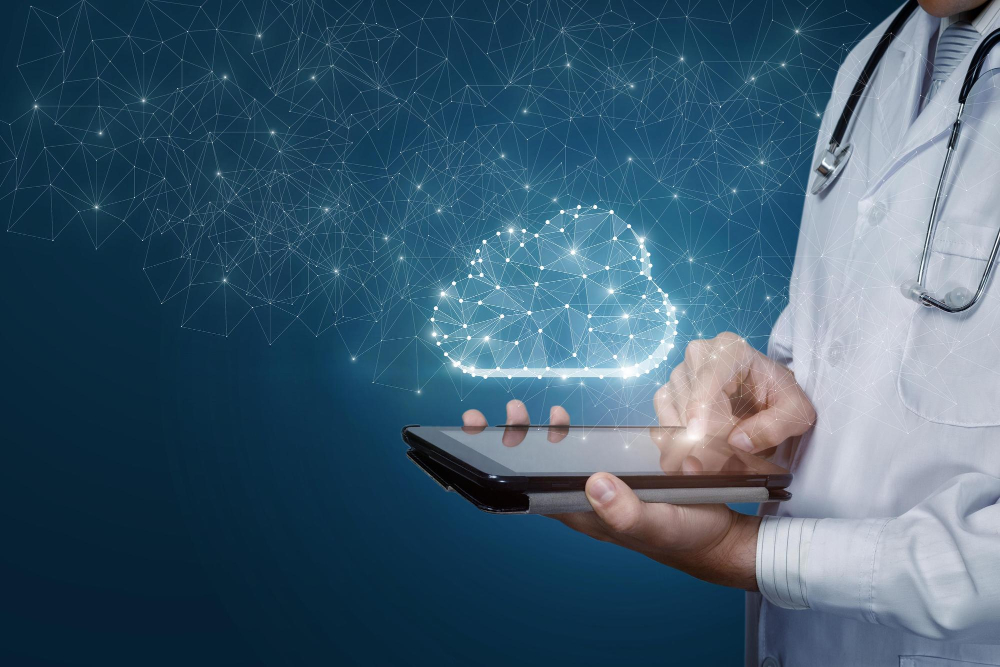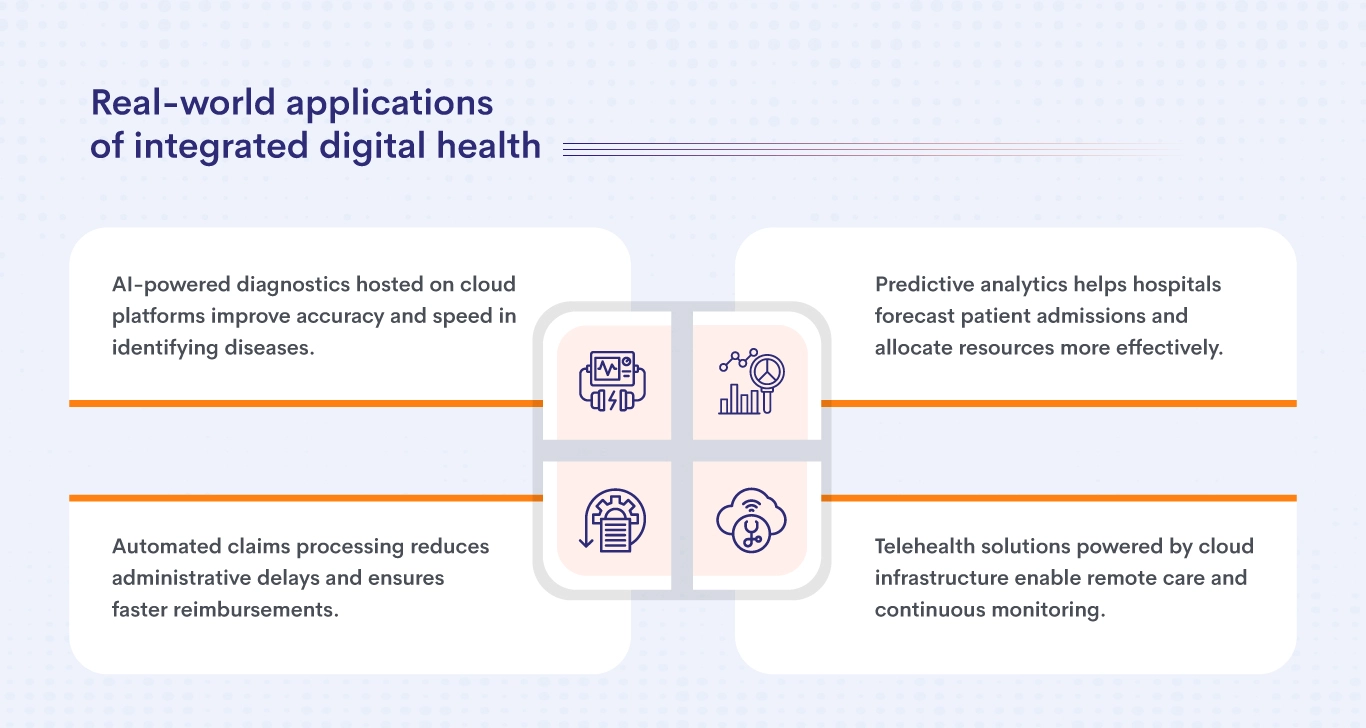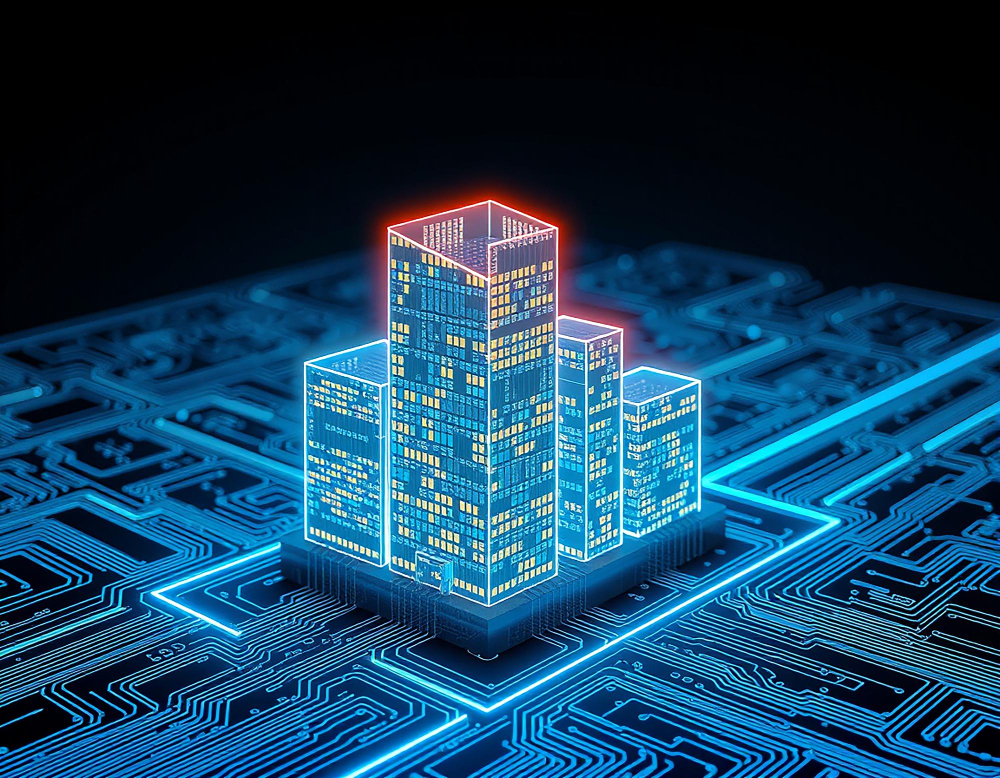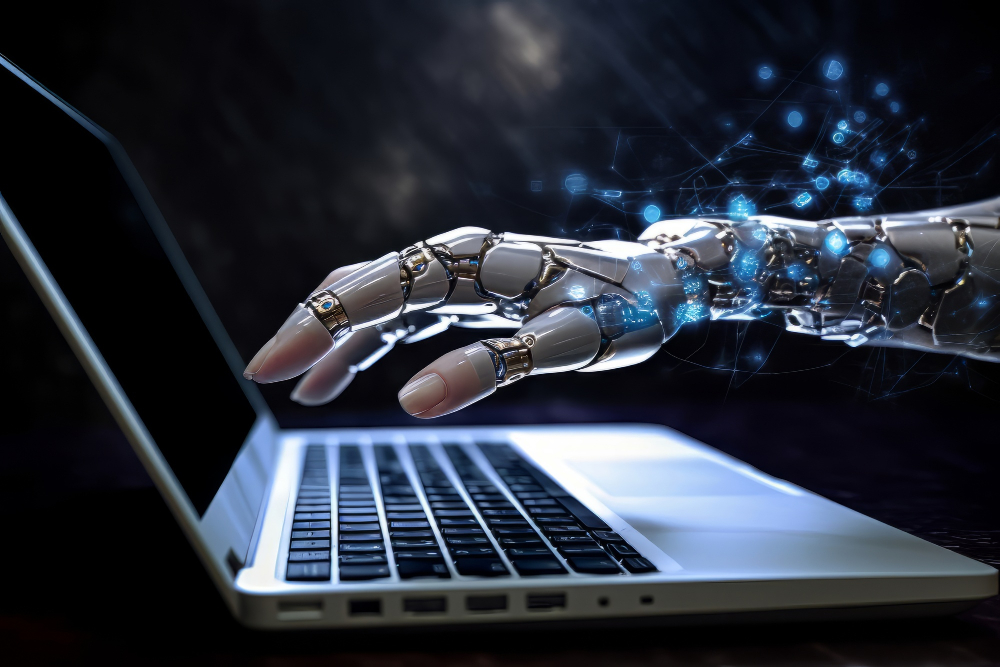- Blog
- November 20, 2025
Shaping the Future of Digital Health with AI, Cloud, and Automation

- Blog
- November 20, 2025
Shaping the Future of Digital Health with AI, Cloud, and Automation
The future of healthcare is being shaped not just by medical breakthroughs but by the intelligent use of technology. Today’s hospitals and health systems are no longer limited by walls or paper records. They are powered by artificial intelligence (AI), cloud computing, and automation, forming a digital foundation that connects patients, providers, and data like never before.
As these technologies converge, healthcare is moving from reactive care to predictive and personalized care. The result is a more connected, efficient, and data-driven environment where decisions are faster, outcomes are better, and care delivery is more human-centered. For organizations looking to thrive in this new landscape, embracing these innovations is no longer optional, it’s essential.
The shift toward intelligent digital health
In recent years, healthcare has undergone a digital transformation unlike any other industry. The pandemic accelerated this change, pushing providers to adopt telehealth, remote monitoring, and digital collaboration tools almost overnight. While this shift improved accessibility, it also exposed a critical gap, many systems remain fragmented, with disconnected data and manual workflows.
The next evolution of healthcare focuses on integration and intelligence. AI, cloud, and automation work together to unify patient data, streamline operations, and enhance decision-making. With these technologies, healthcare organizations can move beyond basic digitization to create an intelligent ecosystem that learns, adapts, and continuously improves care delivery.
Smarter decisions with AI in healthcare
Artificial intelligence is transforming every layer of healthcare. It enables providers to analyze vast amounts of data quickly and accurately, leading to earlier diagnoses and more personalized treatment plans.
For example, AI-powered imaging tools can detect diseases like cancer at an early stage by identifying subtle patterns that might escape the human eye. Predictive analytics models can flag high-risk patients before their conditions worsen, allowing for preventive intervention. In patient communication, AI-driven chatbots and assistants explain conditions, medications, and follow-up steps in simple language, improving understanding and adherence.
AI is also streamlining administrative operations. From automating insurance claims to organizing clinical documentation, it reduces time-consuming manual work and minimizes human error. By turning complex data into actionable insights, AI helps clinicians make better decisions and allows patients to stay engaged in their own care.
The cloud advantage in healthcare transformation
The cloud is the backbone of modern healthcare innovation. It provides the infrastructure to store, manage, and share massive amounts of medical data securely and efficiently. Cloud-based platforms make it possible for healthcare teams to collaborate in real time whether they are across departments, cities, or even continents.
By hosting electronic health records (EHRs) and diagnostic data in the cloud, healthcare providers gain a unified, always-accessible view of patient information. This enables faster diagnoses, reduces duplication of tests, and supports coordinated care.
Cloud technology also plays a critical role in AI deployment and scalability. It allows healthcare organizations to train and deploy AI models across multiple locations without the need for costly infrastructure. At the same time, compliance frameworks such as HIPAA and GDPR ensure that sensitive patient data remains protected.
For healthcare organizations, the cloud represents more than just storage. It’s a secure and scalable engine that powers innovation and collaboration.
The power of automation in modern healthcare
Automation is redefining how healthcare organizations manage day-to-day operations. By handling repetitive tasks, it allows medical staff to focus more on patients and less on paperwork.
For example, robotic process automation (RPA) can manage appointment scheduling, billing, and insurance verification automatically. Intelligent automation goes a step further by combining AI with RPA, enabling the system to make decisions based on real-time data. It can spot missing information in claims, predict supply shortages, and even recommend staffing adjustments.
Automation also improves patient experiences. From quick check-ins at hospitals to instant digital receipts and follow-ups, it brings efficiency and consistency to every step of the journey. When integrated with AI and the cloud, automation becomes a force multiplier, creating a smarter, faster, and more responsive healthcare ecosystem.
Combining intelligence and efficiency in healthcare
Individually, AI, cloud, and automation each bring significant value. Together, they completely redefine how healthcare operates.
Consider a connected hospital system where patient data is stored securely in the cloud, analyzed by AI to detect early signs of disease, and managed through automated workflows that ensure timely intervention. This seamless integration enables continuous care rather than episodic treatment.
The combination of these technologies delivers measurable results:
- Better outcomes through data-driven insights and faster diagnosis.
- Higher efficiency with automated workflows and real-time collaboration.
- Reduced costs through optimized resource use and predictive analytics.
- Improved patient experiences with personalized care and instant communication.
The synergy of AI, cloud, and automation is not just a trend. It’s the foundation of the next generation of healthcare systems.
Real-world applications of integrated digital health
Healthcare providers and technology leaders are already witnessing the benefits of combining AI, cloud, and automation in real-world scenarios:

- AI-powered diagnostics hosted on cloud platforms improve accuracy and speed in identifying diseases.
- Predictive analytics helps hospitals forecast patient admissions and allocate resources more effectively.
- Automated claims processing reduces administrative delays and ensures faster reimbursements.
- Telehealth solutions powered by cloud infrastructure enable remote care and continuous monitoring.
The future of digital health and patient empowerment
The next chapter of digital health will be driven by intelligent systems that combine AI’s analytical power, the cloud’s scalability, and automation’s precision. Together, they will make healthcare more predictive, personalized, and accessible.
Imagine AI assistants that analyze wearable data, alert patients to potential health risks, and recommend preventive steps. Imagine care teams receiving real-time updates from automated systems that track vitals and medication schedules. This future is not far away. It’s unfolding now.
MSRcosmos is helping healthcare organizations embrace this change by building secure, scalable, and intelligent ecosystems that integrate these technologies seamlessly. The company’s vision is simple yet powerful: to make healthcare smarter, more connected, and more human.
As healthcare continues to evolve, those who combine data, intelligence, and automation will lead the way toward better outcomes for patients and providers alike. The convergence of AI, cloud, and automation is not just transforming healthcare; it’s defining its future.




